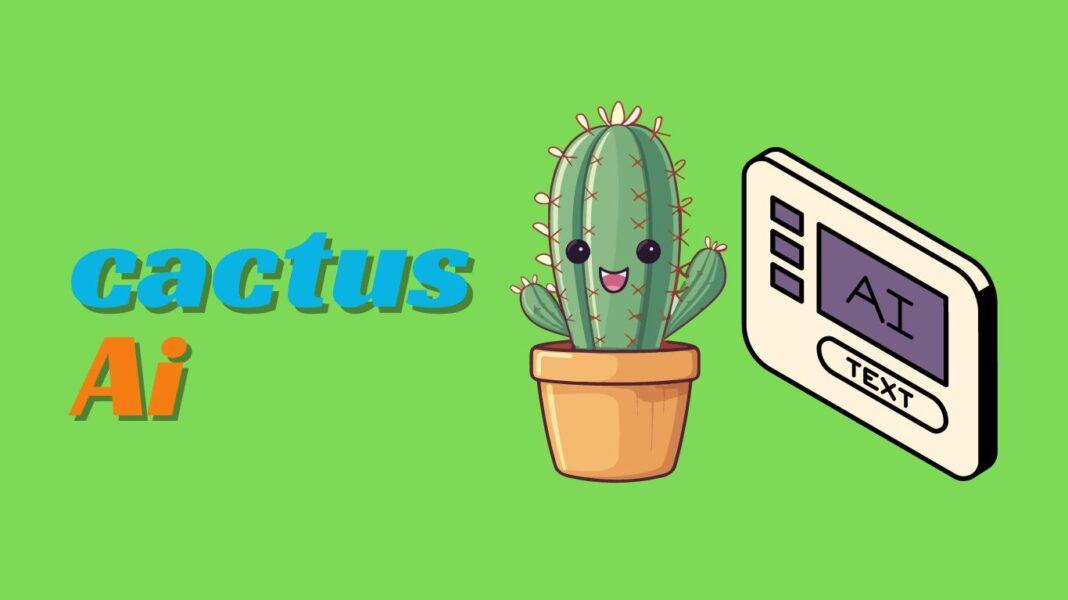In recent years, the intersection of agriculture and artificial intelligence has given rise to groundbreaking innovations. One such marvel is Cactus AI, a cutting-edge technology that is reshaping the way we approach farming. This article delves into the intricacies of Cactus AI, its role in agriculture, benefits, functioning, real-world applications, challenges, and the promising future it holds for the farming industry.
I. Introduction
A. Definition of Cactus AI
Cactus AI refers to the integration of artificial intelligence (AI) in agriculture, specifically tailored to the unique needs of cactus cultivation. This revolutionary technology aims to enhance farming practices by leveraging data-driven insights and intelligent decision-making processes.
B. Importance of AI in Agriculture
The incorporation of AI in agriculture has become increasingly crucial as farmers seek more efficient and sustainable ways to manage crops. Cactus AI, in particular, addresses the specific challenges associated with cactus cultivation, providing tailored solutions for optimal yield and resource utilization.
II. The Role of Cactus AI in Farming
A. Monitoring and Data Collection
Cactus AI excels in continuous monitoring and data collection, enabling farmers to gather real-time information about soil conditions, temperature, and crop health. This data-driven approach empowers farmers with valuable insights to make informed decisions.
B. Precision Agriculture
Precision agriculture is a key aspect of Cactus AI, allowing farmers to precisely control inputs such as water, fertilizers, and pesticides. This targeted approach not only improves crop quality but also minimizes waste and environmental impact.
C. Resource Optimization
Cactus AI optimizes resource allocation by analyzing the specific needs of cactus crops. Through smart irrigation systems and automated processes, farmers can ensure that resources are utilized efficiently, resulting in cost savings and sustainable farming practices.
III. Benefits of Implementing Cactus AI
A. Increased Crop Yield
One of the primary benefits of Cactus AI is the significant increase in crop yield. By leveraging data analytics and predictive modeling, farmers can implement strategies that maximize productivity and yield high-quality cactus crops.
B. Water Conservation
Cactus AI plays a pivotal role in water conservation, a critical concern in arid regions where cactus cultivation is prevalent. Smart irrigation systems based on real-time data help farmers optimize water usage, reducing waste and promoting sustainable water management.
C. Pest Control
Cactus AI incorporates advanced pest detection algorithms, enabling farmers to identify and address potential pest threats promptly. This proactive approach minimizes crop damage, reduces the need for chemical interventions, and promotes environmentally friendly pest control methods.
IV. How Cactus AI Works
A. Sensor Integration
Cactus AI relies on sensor integration to collect data from the farm environment. Sensors placed in the soil, on plants, and throughout the field continuously monitor various parameters, providing a comprehensive understanding of the farming ecosystem.
B. Machine Learning Algorithms
Machine learning algorithms form the backbone of Cactus AI, analyzing vast datasets to identify patterns and correlations. These algorithms enable the system to make data-driven predictions, offering valuable insights into crop health, growth patterns, and potential challenges.
C. Real-time Decision Making
One of the standout features of Cactus AI is its ability to make real-time decisions. Based on the analyzed data, the system can autonomously adjust irrigation levels, identify and address pest threats, and optimize farming practices on the fly, enhancing overall efficiency.
V. Successful Case Studies
A. Farms Using Cactus AI
Several farms worldwide have embraced Cactus AI with remarkable success. These pioneers have reported increased crop yields, improved resource efficiency, and enhanced overall farm management.
B. Improved Farming Practices
Cactus AI has led to a paradigm shift in farming practices, with farmers adopting more sustainable and data-driven approaches. This shift not only benefits individual farms but also contributes to the larger goal of creating a more sustainable and resilient agricultural sector.
C. Economic Impact
The economic impact of Cactus AI extends beyond individual farms. Increased productivity and resource efficiency contribute to a more robust agricultural sector, positively influencing local economies and global food supply chains.
VI. Challenges and Solutions
A. Technical Challenges
While Cactus AI offers tremendous benefits, there are technical challenges associated with its implementation. These include issues related to sensor accuracy, data security, and system reliability. Ongoing research and technological advancements aim to address these challenges and further enhance the efficacy of Cactus AI.
B. Training and Adoption
The successful implementation of Cactus AI requires farmers to adapt to new technologies. Training programs and educational initiatives are essential to facilitate the seamless adoption of Cactus AI and ensure that farmers can leverage its full potential.
C. Future Developments
The future of Cactus AI holds exciting possibilities. Ongoing research and development efforts are focused on refining algorithms, enhancing sensor technology, and exploring synergies with other emerging technologies, promising continuous advancements in smart farming.
VII. The Future of Cactus AI in Agriculture
A. Continuous Innovation
The field of Cactus AI is dynamic and continually evolving. Innovations in machine learning, sensor technology, and data analytics are expected to drive continuous improvements, making Cactus AI an indispensable tool for modern agriculture.
B. Integration with Other Technologies
Cactus AI is poised to integrate with other emerging technologies such as Internet of Things (IoT) devices, drones, and satellite imaging. This integration will create a comprehensive farming ecosystem that maximizes efficiency and sustainability.
C. Global Impact
As Cactus AI gains widespread adoption, its global impact on agriculture cannot be understated. The technology has the potential to address food security challenges, especially in arid regions, and contribute to the development of more resilient and sustainable farming practices worldwide.
VIII. Conclusion
In conclusion, Cactus AI is a game-changer for the agriculture industry, offering tailored solutions for cactus cultivation and beyond. Its role in monitoring, resource optimization, and decision-making presents a transformative approach to farming. As challenges are addressed and technology continues to evolve, the future of Cactus AI holds the promise of a more sustainable and productive agricultural landscape.



